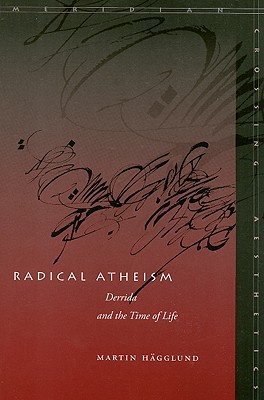

 |

|

The average rating for Radical atheism based on 2 reviews is 4.5 stars.
Review # 1 was written on 2014-12-29 00:00:00 Markus Buri Markus BuriThis is probably the most useful and important book on Derrida in years. Hagglund's work focuses on the importance of understanding Derrida as a thinker of mortality. Life is inescapably intertwined with the fundamental spacing of temporality: the idea that the "now" is always divided by time. Presence is never fully present because it is always slipping into the past, making even the fundamental notion of self-same identity impossible. Living is an encounter with others that is always pierced by the risk of contamination, invasion, and death. His critique of the so-called "religious turn" typified by John Caputo, Kevin Hart, and others is particularly important in order to understand the radical potential of this kind of thinking. |
Review # 2 was written on 2020-06-26 00:00:00 Josh Allison Josh AllisonThis book on Derrida demonstrates that there never has been any religious turn in the speculation of the philosopher from Algeria. Martin Hägglund focuses on the incompatibility of the key motif of survival with immortality, since to survive is to resist death inside the passing of time that can't be retained nor can it retain the individual themselves. For time is indissolubly intertwined with space (what Derrida calls "espacement" i. e. spacing). In other words "time" consists of ceaseless becoming. Thus the individual is divided by time and time itself is divided into "becoming - space of time" and "becoming - time of space" in a process that is described as "infinite finitude" . I noticed that what Derrida calls "differance" carries with it the full meaning of the etymology of the term. "Differance" comes from the Latin verb "differre" which means not only "to be different" but also "to delay". In addition the concepts formulated by Martin Hägglund through Derrida recall also another aspect of the latin verb whose past participle "dilatus-dilata-dilatum" gives birth to the verb "to dilate", that contains the primary idea of an expansion of time. "Differance" embraces both the concepts of delaying and dilating. Infinite finitude. The "trace" is the spatial side of the differance, it is what remains, as an event between the past and the future, the epiphany of identity at the moment of the emergence of non-identity. Hägglund objects Kevin Hart and Jean-Luc Marion arguments that "assimilate deconstruction to negative theology" by virtue, particularly, of two Derrida's texts "How to avoid speaking" and "Sauf le nom", both on negative theology. The "logic of identity" is analysed in the chapter 2, Autoimmunity of Time - Derrida and Kant, while one of the key points of Derrida, the arche-writing, is analysed through a parallelism to Husserl along with the concept of temporality and the problem of "being divided by time". In Chapter 3 Hagglünd pursues the argument of time as violence and the difference between the "trace" in Derrida and Levinas who is the philosopher who inspired Derrida's choice of the term "trace". What is at stake is the deconstruction of finitude according to Kant and Derrida. The chapter 4 is not only a philosophical analysis on the autoimmunity of life and Derrida's radical atheism. It carries with it Derrida's bond of affection to his mother. One of the most striking feature of Hägglund’s style is he treats philosophy like an "erlebnis" and by this I mean that Hägglund’s analyses are not an aseptic notomization of theories and thesis, on the contrary they make palpable the most vibrating part of our existence made of emotions and feelings. It is the case of the recount of Derrida's grief for the loss of his mother and I could not help myself recalling to my mind the way Derrida himself describes the grief of Roland Barthes for the loss of his mother, in the heartbreaking text of mourning to memorialize Barthes in "The Work of Mourning". In addition when Hägglund underlines the "double bind of survival" for which "Derrida and his mother are caught in a" race against death" (p. 149, Radical Atheism) I have been, reminded of the same race Barthes tried to defeat by searching a photography, as it is written in "Camera Lucida" , of his mother, that could give him a way to recognize her when she "existed" before he came to the world. The chapter 5, Autoimmunity of Democracy, Derrida and Laclau, provides a deconstruction of politics and democracy. It is particularly illuminating because it contains a strong corrective of Democracy on the basis of a finite Democratic process rather than an "atemporal fullness" to succeed. In other words the autoimmunity of democracy paradoxically gives often birth to non Democratic regimes or even violence and abuses because it is conceived as an infinite system, a projection towards the future, whilst it should be considered and applied to the contingency, and intertwined with the concept of finitude. Radical Atheism is a profound and beautiful work, a non conventional reading and interpretation of Jacques Derrida. |
CAN'T FIND WHAT YOU'RE LOOKING FOR? CLICK HERE!!!